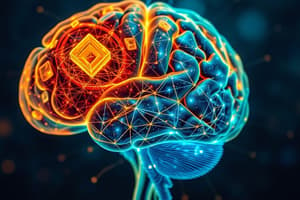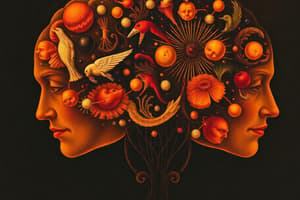Podcast
Questions and Answers
According to Charles Spearman's theory, what does the general factor (g) represent?
According to Charles Spearman's theory, what does the general factor (g) represent?
Who introduced the concept of Intelligence Quotient (IQ) as a measure of cognitive abilities?
Who introduced the concept of Intelligence Quotient (IQ) as a measure of cognitive abilities?
What was the main aim of Alfred Binet's standardized IQ test?
What was the main aim of Alfred Binet's standardized IQ test?
What concept did Francis Galton believe could be quantified numerically?
What concept did Francis Galton believe could be quantified numerically?
Signup and view all the answers
Which early scientist focused on intelligence being hereditary?
Which early scientist focused on intelligence being hereditary?
Signup and view all the answers
According to early intelligence theories, what was the purpose of Galton's IQ concept?
According to early intelligence theories, what was the purpose of Galton's IQ concept?
Signup and view all the answers
According to Thurstone's Theory of Primary Mental Abilities, how many factors did Thurstone identify?
According to Thurstone's Theory of Primary Mental Abilities, how many factors did Thurstone identify?
Signup and view all the answers
Which theory defines intelligence as multifaceted and encompassing various dimensions or types?
Which theory defines intelligence as multifaceted and encompassing various dimensions or types?
Signup and view all the answers
In Gardner's Theory of Multiple Intelligences, which type of intelligence involves understanding oneself?
In Gardner's Theory of Multiple Intelligences, which type of intelligence involves understanding oneself?
Signup and view all the answers
What distinguishes Sternberg's Triarchic Theory from other theories of intelligence?
What distinguishes Sternberg's Triarchic Theory from other theories of intelligence?
Signup and view all the answers
Which modern theory integrates cognitive, attitudinal, relational, and behavioral components to offer a holistic view of intelligence?
Which modern theory integrates cognitive, attitudinal, relational, and behavioral components to offer a holistic view of intelligence?
Signup and view all the answers
What do critics argue about Gardner's Theory of Multiple Intelligences?
What do critics argue about Gardner's Theory of Multiple Intelligences?
Signup and view all the answers
Study Notes
Intelligence Theories Overview
Intelligence theories encompass a wide range of approaches attempting to explain the human cognitive capacity to learn, reason, plan, recall information, recognize objects, comprehend symbols, and deal with abstract concepts. Through centuries of scientific study, researchers have proposed several models of intelligence, focusing on either general or multiple dimensions. Here is an overview of notable theories with a critical analysis of their key features and limitations, referenced from various sources.
Early Intelligence Theories
Early scientists like Francis Galton and Alfred Binet contributed significantly to the understanding of intelligence, proposing theories that laid the groundwork for future research.
Galton's Theory
Galton introduced the concept of intelligence quotient (IQ) as a measure of an individual's cognitive abilities. His belief was that intelligence was hereditary and could be quantified numerically.
Binet's Work on IQ
Alfred Binet, building on Galton's foundation, designed the first standardized IQ test to assess children’s learning potential. This test aimed to identify individuals requiring special educational support.
General Intelligence Theories
These theories posit that intelligence is a singular entity, represented by one or more underlying variables.
Spearman's Two Factor Theory
Charles Spearman proposed that intelligence is composed of a general factor (g) and specific factors (s). While this theory was influential, it failed to capture the complexity of human intelligence.
Thurstone's Theory of Primary Mental Abilities
Thurstone expanded Spearman's theory by identifying seven factors: numerical reasoning, verbal meaning, memory, inductive reasoning, perceptual speed, spatial ability, and word fluency. This approach provided more nuanced perspectives on intelligence but still lacked a comprehensive understanding.
Multiple Intelligence Theories
These theories suggest that intelligence is multifaceted, encompassing various dimensions or types.
Gardner's Theory of Multiple Intelligences (MI)
Howard Gardner proposed eight primary types of intelligence: bodily kinesthetic, logical-mathematical, interpersonal, musical, intrapersonal, verbal linguistic, naturalistic, and visual spatial. Critics argue that MI does not provide sufficient empirical evidence to support specific subsets of abilities.
Sternberg's Triarchic Theory
Robert Sternberg introduced the Triarchic theory, which distinguishes between three aspects of intelligence: practical, experiential, and componential. However, some researchers question whether what he calls practical intelligence is merely sets of skills developed over time rather than inherent abilities.
Contemporary Views on Intelligence
Modern theories seek to integrate multiple perspectives, recognizing the complexity and diversity of human cognitive abilities. For example, the layered model of emotional intelligence combines cognitive, attitudinal, relational, and behavioral components to form a more holistic view of intelligence.
In conclusion, our understanding of intelligence continues to evolve as scientists research and refine their theories. While no single theory has emerged as definitively correct, they collectively offer valuable insights into the nature of human cognitive abilities.
Studying That Suits You
Use AI to generate personalized quizzes and flashcards to suit your learning preferences.
Description
Explore an overview of intelligence theories, from early concepts by Galton and Binet to modern multiple intelligence theories like Gardner's MI and Sternberg's Triarchic Theory. Learn about general intelligence theories like Spearman's Two Factor Theory and Thurstone's Theory of Primary Mental Abilities, along with contemporary views on intelligence integration.




